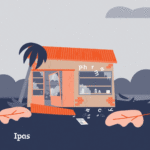
Research findings from Mozambique and Bangladesh
Climate change is now affecting every country on every continent, disrupting national economies and individual lives.
The Rohingya women and girls who have suffered sexual torture and humiliation and have now fled their homes most certainly deserve whatever care may alleviate some of their suffering. By not providing comprehensive reproductive health care, including contraception and safe abortion services, humanitarian agencies have taken a side, the side that opposes women’s human rights, the side that opposes science and common sense, the side that flies against established international agreements. Doing nothing speaks volumes.
This study aimed to support the development of a mobile phone intervention to support postmenstrual regulation family planning use in Bangladesh. It explored what family planning information women want to receive after having a menstrual regulation procedure, whether they would like to receive this information via their mobile phone, and if so, what their preferences are for the way in which it is delivered. Participatory interviews were conducted with 24 menstrual regulation clients in Dhaka and Sylhet divisions in Bangladesh.
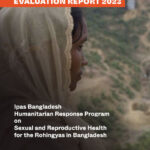
This evaluation report details the 2022 performance evaluation of the “Humanitarian Response Program” implemented in the Rohingya refugee camps in Cox’s Bazar, Bangladesh by Ipas. The evaluation assessed facility readiness and capacity of the service providers to provide comprehensive menstrual regulation (MR), post abortion care (PAC), contraceptive services and trauma/survival centered care. This evaluation also documents relevant challenges and barriers faced during program implementation and provides recommendations for the program’s sustainability and future
scale-up.
The objective of this study was to understand intersections between intimate partner violence (IPV) and other constraints to women’s reproductive autonomy, and the influence of IPV on reproductive health. There were 457 participants included in the analysis and 118 (25.8%) had experienced IPV in the preceding year. IPV was associated with discordance in fertility intentions with husbands/partners and in-laws, with in-law opposition to contraception, with perceived religious prohibition of contraception, and with presenting unaccompanied. Ensuring women’s reproductive freedom requires addressing IPV and related constraints.
This study sought to understand correlates of postabortion contraceptive use at the individual, family and abortion service delivery levels. Potential individual level correlates included contraceptive and abortion history and fertility intentions; family correlates included intimate partner violence (IPV), discordance in fertility intentions, and household decision-making; and service delivery correlates included procedure type and postabortion contraceptive counseling.
In Bangladesh, abortion is restricted except to save the life of a woman, but menstrual regulation is allowed to induce menstruation and return to non-pregnancy after a missed period. MR services are typically provided through the Directorate General of Family Planning, while postabortion care services for incomplete abortion are provided by facilities under the Directorate General of Health Services. The bifurcated health system results in reduced quality of care, particularly for postabortion care patients. This study evaluated the success of a pilot project that aimed to integrate menstrual regulation, postabortion care and family planning services across six Directorate General of Health Services and Directorate General of Family Planning facilities by training providers on woman-centered abortion care and adding family planning services at sites offering postabortion care.
This study sought to understand women’s experiences using medication for menstrual regulation in Bangladesh. In-depth interviews were conducted with 20 rural and urban women.The majority had had positive experiences with medication for menstrual regulation and successful outcomes. Continued efforts to improve counselling by providers about the dose, medication and side-effects of medication for menstrual regulation, along with education of the community about medication as an option for menstrual regulation, will help to de-stigmatise the procedure and the women who seek it.
Contraception is an essential element of high-quality abortion care. However, women seeking abortion often leave health facilities without receiving contraceptive counselling or methods, increasing their risk of unintended pregnancy. This paper describes contraceptive uptake in 319,385 women seeking abortion in 2,326 public-sector health facilities in eight African and Asian countries. Ministries of Health integrated contraceptive and abortion services, with technical assistance from Ipas. Overall, postabortion contraceptive uptake was 73 percent. The findings demonstrate high contraceptive uptake when it is delivered at the time of the abortion, a wide range of contraceptive commodities is available, and ongoing monitoring of services occurs.
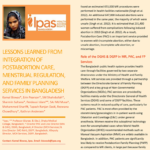
Lessons learned from integration of postabortion care, menstrual regulation, and family planning services in Bangladesh. This study recommended working toward improved post-procedure contraception delivery and evidence-based appropriate technology use for all procedures by improving collaboration and integration between Bangladesh’s Directorate General of Health Services (DGHS) and Directorate General of Family Planning (DGFP).
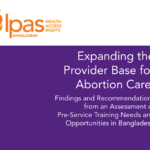
In 2012, Ipas undertook an assessment in Bangladesh, India, Nepal and Pakistan to determine the specific needs and gaps in the pre-service education systems for midlevel providers and to identify opportunities, strategies and recommendations for creating more equitable access to safe abortion care. Sources for the pre-service assessment include curricular review; government documents; key informant interviews; reports; assessments of provider performance and training; and site observation visits. The assessment results and recommendations in this report focus on Bangladesh.
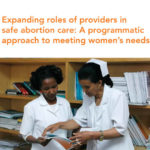
This brief examines the key results from expanding abortion service provision to midlevel providers in 10 Ipas country programs throughout Asia and Africa, including a global analysis of programmatic data from all 10 countries and two case studies (Ethiopia and Bangladesh).

